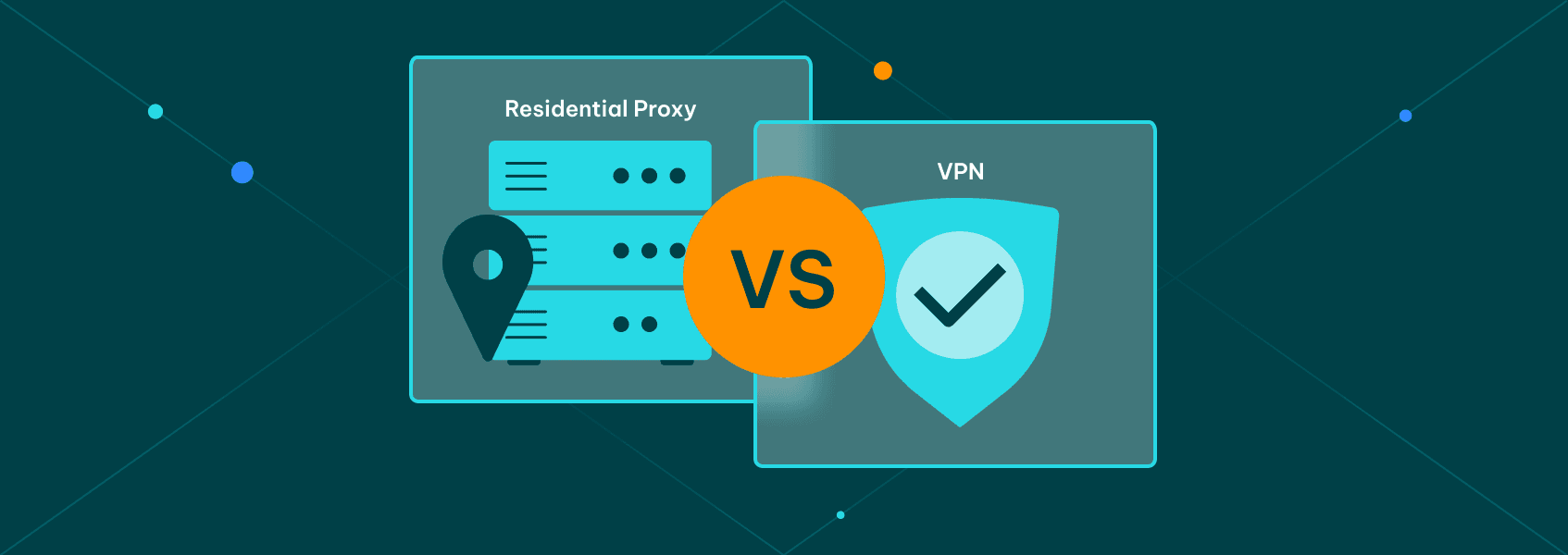Residential Proxy Vs. VPN – All You Need to Know
Proxy fundamentals

Justas Palekas
Residential proxies and VPNs are the primary tools individuals and companies consider when it comes to online privacy. But protecting your online privacy and security is one of many reasons to use any of them. They also allow you to bypass geo-restrictions and improve your online freedom.
Now the question is, which one is better for your personal or business needs? Even though they both hide your IP address, they have some key differences you need to be aware of. Knowing how each of them works and how you will benefit from using them will allow you to pick the right tool for your needs.
What Are the Key Differences Between Residential Proxies and VPNs
Many people need help deciding whether to go with a residential proxy or VPN, mostly because they both shield your original IP address. However, they are designed with different goals in mind and therefore work in different ways.
So, whether you need a residential proxy or VPN depends on your needs. Before we discuss the benefits of these tools for both individuals and businesses, let’s first explain what a residential proxy is , what VPN is and how they work. This will help you understand the difference between them so you can select the right tool for your needs.
Residential Proxies and VPNs – What They Are and How They Work
Residential proxy servers are intermediary servers that replace your IP address with their own and connect you to the target website server. They are obtained from real users and devices like laptops and desktop computers and issued by real internet service providers. Using them will make you look like a regular internet user, guaranteeing high levels of privacy.
They work by taking your web request and sending it to the target web server. Since the target web server sees your proxy’s IP instead of yours, it sends the response to the proxy server, which then forwards it back to you. By routing your internet connection through the proxy server, you keep your original IP address hidden.
On the other hand, VPNs or virtual private networks are intermediary services that encrypt and transmit data when you connect to the internet. In other words, they encrypt your connection and shield your IP address and personal data by rerouting all your online traffic through other servers. A subgroup of VPN, a residential VPN uses IP address from a real mobile device verified by an ISP.
The heavy encryption they use guarantees ultimate levels of security at the sacrifice of your connection speed.
Benefits of Using Residential Proxies vs. VPNs
Now that you know how residential proxies and VPNs work, let’s explain what they can do for you. This will help you figure out their strengths and weaknesses and pick the one that works best for you.
Web Scraping
Almost every modern business scrapes websites to gather valuable data for creating business strategies, marketing campaigns, product development, and more. Residential proxies are great for web scraping as they reduce the chance of CAPTCHAs, as well as being detected and blocked by the target site’s anti-scraping software.
That’s because they are rotating by nature, so your IP address will frequently change, either per request or at a set interval. This feature allows you to scrape massive amounts of data from multiple websites effortlessly and safely and not worry about bans.
Even though VPNs hide your IP address, they are significantly less efficient than rotating residential proxies when it comes to data scraping. One point for residential proxies!
Protecting Your Personal Information
Both residential proxies and VPNs improve your online privacy and security. By keeping your IP address hidden, they protect you from advertisers, snoopers, and cybercriminals. Since VPNs add encryption to your online traffic, they ensure your online activity stays private. This makes them ideal for protecting your personal and corporate data.
At the same time, residential proxies from premium providers add an extra layer of security between your network and the internet. By hiding your IP address, they prevent snoopers and cybercriminals from tracking your online behavior, tracking down your business, and identifying vulnerabilities in your system.
Overall, they can both secure your internet connection, but the point still goes to VPNs.
Bypassing Geo-Restrictions & Streaming
Residential proxies and VPNs allow you to access websites and services unavailable in your region. They do this by masking your IP address with another one from a supported location. This way, you can bypass geo-restrictions and view any web content from anywhere.
However, most online services like Hulu and Netflix have a list of known VPN IP addresses which they block automatically. VPN users usually share the same range of IP addresses, which makes them easier to detect and block. With dedicated residential proxies, however, you get a fresh IP address that’s not shared with anyone else.
Plus, proxies are faster than VPNs, which is essential for streaming. Since VPNs feature heavy encryption, using them inevitably leads to a slower connection. Most residential proxies don’t, so they offer nearly the same level of protection without negatively impacting network speed and performance.
Online Gaming
A good VPN can help you stay safe while playing online multiplayer games. It will protect you from possible DDoS attacks from enemies that want to end your sessions. Using VPNs will also help you find and take advantage of discounts by changing your geographical location.
Residential IPs can help you find better deals on online games as well. They can also help you access games and features that are still not available in your country . But their speed is the most crucial reason they are a better choice than VPNs for gaming. High-quality residential proxies can improve the initial connection time and loading speed, enabling a lag-free gaming experience.
Final Thoughts
Whether you need a residential proxy or VPN comes down to deciding between privacy and speed. If you’re an individual who wants to secure their connection and protect their private data, a VPN is a good choice. However, using residential proxies from premium providers like IPRoyal offers more than just security and privacy on the internet.
Besides providing an additional layer of security and keeping your online identity protected, residential proxies help you scale your business. Using them allows you to perform a variety of business-related online tasks efficiently and safely. These include small or large-scale web scraping projects , ad verification, price monitoring, brand protection, web testing, etc. They are also great for streaming, gaming, and accessing geo-restricted content.

